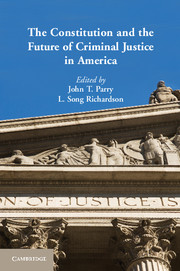Book contents
- Frontmatter
- Contents
- Contributors
- Acknowledgments
- Introduction
- Part I Foundations – The Scope of Criminal Law and Access to Counsel
- Part II Race and Criminal Procedure
- Part III Policing and Privacy
- Part IV Technology and the Surveillance Society
- Part V Confessions and miranda
- 10 False Confessions and the Constitution
- 11 The Foggy Future of Miranda
- Part VI Conviction, Sentencing, and Incarceration
- Part VII Emergencies and Borders – Immigration, Terrorism, National Security, and Transnational Crime
- Index
- References
10 - False Confessions and the Constitution
Problems, Possibilities, and Solutions
Published online by Cambridge University Press: 05 June 2014
- Frontmatter
- Contents
- Contributors
- Acknowledgments
- Introduction
- Part I Foundations – The Scope of Criminal Law and Access to Counsel
- Part II Race and Criminal Procedure
- Part III Policing and Privacy
- Part IV Technology and the Surveillance Society
- Part V Confessions and miranda
- 10 False Confessions and the Constitution
- 11 The Foggy Future of Miranda
- Part VI Conviction, Sentencing, and Incarceration
- Part VII Emergencies and Borders – Immigration, Terrorism, National Security, and Transnational Crime
- Index
- References
Summary
Introduction
On November 17, 1989, police in Peekskill, New York, discovered the body of fifteen-year-old Angela Correa, who had been raped, beaten, and strangled. On the basis of a detailed profile of the alleged offender prepared by Raymond M. Pierce of the New York Police Department, as well as behavior that they perceived to be highly unusual, Peekskill Detectives Thomas McIntyre and David Levine quickly locked in on Jeffrey Deskovic, a sixteen-year-old classmate of the victim who had been late to school the day after the victim disappeared, as their exclusive suspect. They sought to build a case against him by obtaining his confession to the crime.
Between December 1989 and January 1990, the detectives questioned Deskovic eight times. Throughout these contacts, the police used what they termed passive/active techniques, alternating from low-key questioning to high-stress, accusatory, and confrontational interrogation in an effort to induce Deskovic to confess. On January 25, 1990, the detectives gave Deskovic three polygraph exams and interrogated him for approximately eight hours. When they were unable to obtain a confession, even after falsely telling Deskovic that he had failed the polygraph tests, the detectives became more aggressive and confrontational. According to Deskovic, Detective McIntyre told him repeatedly that all the evidence, including the polygraphs, conclusively established his guilt and threatened that if Deskovic did not confess, he would go to prison. However, Detective McIntyre promised that if he confessed, he would receive psychiatric treatment and be allowed to go home.
- Type
- Chapter
- Information
- The Constitution and the Future of Criminal Justice in America , pp. 169 - 186Publisher: Cambridge University PressPrint publication year: 2013
References
- 1
- Cited by



